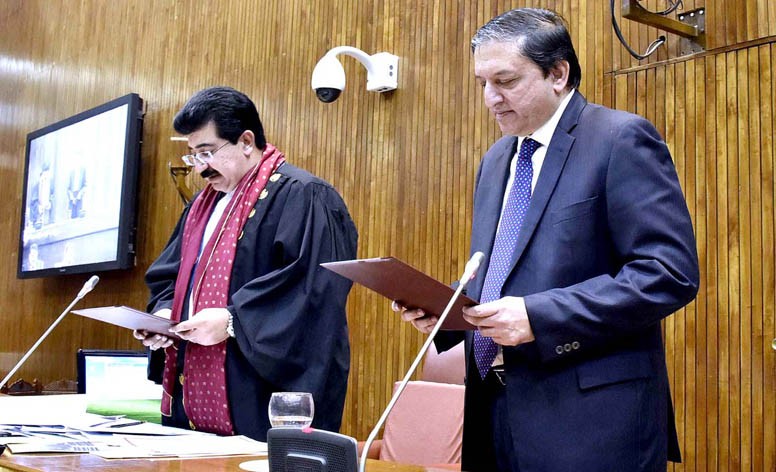
It is important to unpack the liberals’ grouse against this ‘immoral’ brand of politics, particularly the charge of siding with the establishment

They came together in January this year to test the limits of the art of the possible. Of all the parties that had gathered at Lahore’s Charing Cross to show solidarity with Pakistan Awami Tehreek in its protest against the Model Town killings, the odd one out was Pakistan People’s Party (PPP). The leaders of all parties said what they had to but the show was broadly assessed as lacklustre, with television cameras focusing on empty chairs as proof.
Today, the uneasy partners, Pakistan Tehreek-i-Insaf (PTI) and PPP have redeemed their rather dull coming together in Lahore by scoring a solid victory in the recent election of Senate’s chairman and deputy chairman. But the media is abuzz with unhappy cries -- about weakened democracy, threats to federation, PPP deciding to be on the wrong side of history by siding with the establishment and so on.
The liberal voices are unanimous in their condemnation of PPP (they don’t bother much about PTI anyway). Admittedly, the mourning is largely about the party letting go of Farhatullah Babar as senator and Raza Rabbani as consensus chairman as proposed by Pakistan Muslim League-Nawaz (PML-N).
It is therefore important to unpack the liberals’ grouse against this ‘immoral’ brand of politics, and try and understand the other side’s compulsions.
First, the more obvious of what this election has done for the three major parties: PPP that was at its weakest ever has made itself relevant again; PML-N that looked invincible after winning most by-elections could not save what it claimed was the most important election for it; PTI that rode the high horse of principled politics has finally come around to acknowledging politics as the art of the possible.
Effectively, PML-N that had kept its hopes alive about March 2018 for about a year and a half saw the successful holding of this election, and then losing it. Those who are worried about history’s right and wrong side need to brush up their own knowledge of history. But to that later.
Let’s look at the weakened democracy argument first. The assumption that the single largest party has the ‘moral’ right to form the government or have its members elected as leaders in the house does not always work in the current democratic system, not just here but across the world. There have been instances, even next door, where the far right and far left have formed coalitions to prevent the single largest centrist party from forming the government.
In the current scenario, PPP could not afford to be seen as cosying up to PML-N so close to the general election. By so doing, it would have given a field day to its natural rival. Besides, political parties tend to agree on consensus candidates only when they are left with no alternative. When they have an option, they try it. This election was as crucial for the opposition as it was for the government, because it was presumed to set some kind of tone for the impending general election.
In any polity, expecting one side to exercise moral choices that are consequential to politically costly ends is faulty, especially when the high moral ground granted to the other side is equally shaky. Analysts have pointed out PML-N’s utter disregard for assemblies that came to haunt them first in the Balochistan Assembly and now in the Senate. Not to forget that Raza Rabbani at one time stopped working as chairman because of the attitude of treasury benches.
By not going to the parliament as prime minister, by governing through a select group of civil servants, by taking key decisions without discussing them in the parliament or even the cabinet, Nawaz Sharif has proved that democracy has a wider scope than how he interprets it.
Also, the threats-to-federation argument is indicative of historical amnesia because it was PPP under Asif Ali Zardari that brought the Eighteenth amendment and hence provincial autonomy including that of Gilgit-Baltistan into effect, apart from the NFC Award and Balochistan Rights Package.
The most insidious charge against the opposition has been of siding with the establishment. Let’s first be very clear that Panama Leaks was not a creation of the establishment (PML-N must know that investing wealth in offshore companies when you are leading the country’s largest party and government does have serious moral implications). Let’s also be clear that the establishment, representing and allying with unelected institutions, is a reality in Pakistan. It only follows logically that PML-N now seeking an apology for playing establishment’s pawn in destabilising the last PPP government may not cut ice with the latter, as it hasn’t.
As for those who swear by PML-N’s anti-establishment credentials, they must not ignore Mushahid Husain’s rejoining of the party a month before the Senate election (he was the other person touted as the party’s chairman candidate). While Rana Maqbool and Shaheen Butt are ingenious choices in their own right, the nomination of the most pro-establishment candidate for chairman says a lot. The suggestion is that if Raja Zafarul Haq won, it would have been an ‘untainted’ victory for democracy. Really?
In the final analysis, all parties played as per the stated rules; for their own personal and party interests. Sanjrani’s victory has not served the Balochistan cause any more than democracy was defeated on March 12. You could say that both sides played along with the establishment. Those who managed more numbers on their side won.